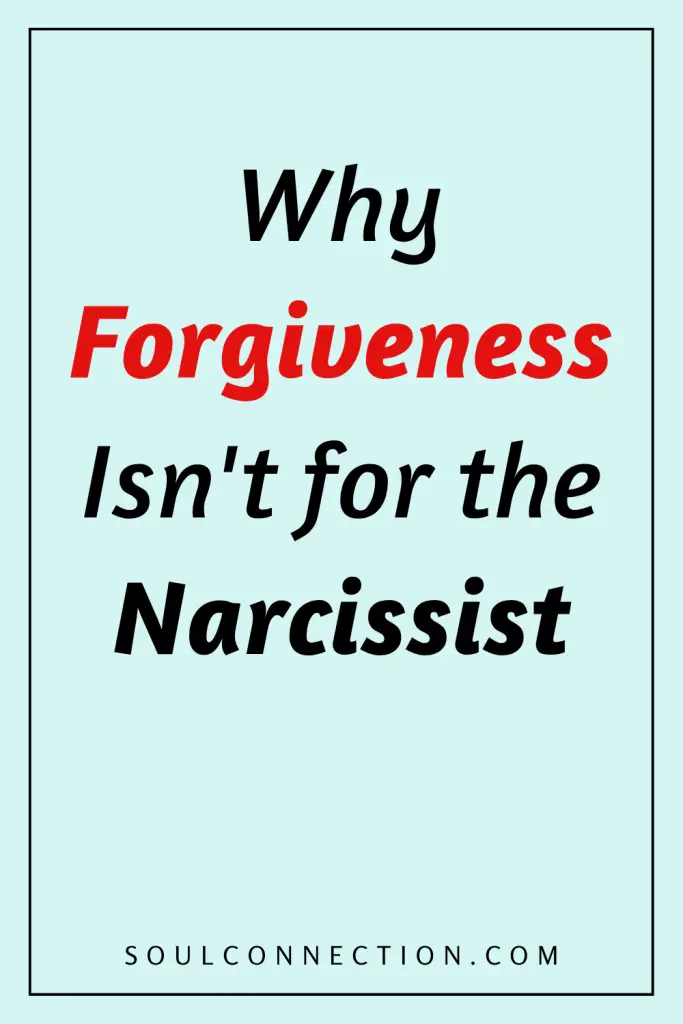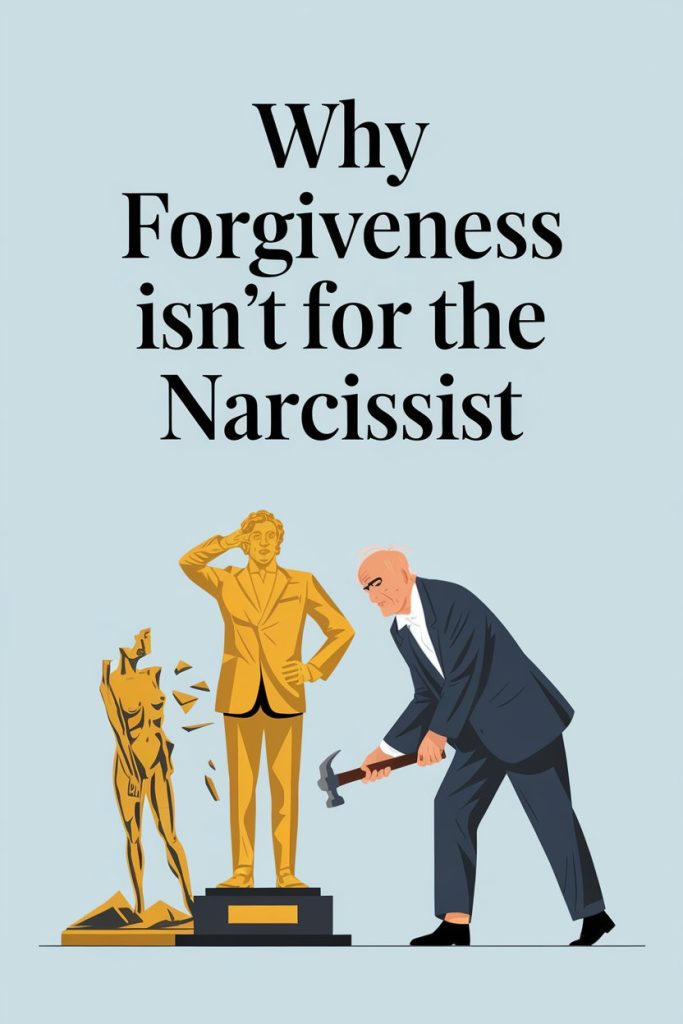Forgiveness gets a glossy reputation. Instagram quotes practically promise you inner peace if you offer it up. But what if you’re tangled with someone who treats accountability like it’s an urban legend?
When narcissism enters the chat, forgiveness becomes less about you getting Zen and more about self-preservation.
What’s really happening when you try to forgive a narcissist? Why does it feel like hugging a cactus?
Time for some myth-busting and practical wisdom—served with a side of wit, because heaven knows we all need it.
The Anatomy of Narcissism
Narcissism isn’t just garden-variety selfishness or that one cousin who posts a hundred selfies a week. In its clinical form, narcissistic personality disorder is a pattern of grandiosity, need for admiration, and a distinct lack of empathy.
For the garden-variety self-obsessed, there might be hope. For the dyed-in-the-wool narcissist, expecting genuine remorse is like looking for a unicorn at a dog park.
Here’s the kicker: Narcissists are wired to protect their ego at any cost. Accountability is viewed as a threat, not a virtue.
Apologies, if they happen at all, are often weaponized. “I’m sorry you feel that way” doesn’t quite cut it, does it?
Why Forgiveness Feels So Different with a Narcissist
Forgiveness is usually about moving forward. You acknowledge a wrong, process the pain, accept a sincere apology, and—if the stars align—restore some trust.
When the person on the other side can’t or won’t acknowledge any wrongdoing, the whole process short-circuits.
Instead of closure, you’re left holding an empty bag—sometimes literally.
Narcissists rarely own up to their behavior. Apologies, if they arrive, come loaded with conditions or blame-shifting. You might find yourself apologizing to them for being hurt.
That’s not forgiveness. That’s emotional gaslighting in a party dress.
The Myth of the Healing Forgiveness
There’s a certain pop psychology narrative: “Forgive, and you’ll heal!” For people tangled with narcissists, this advice often backfires. Forgiveness isn’t a magic spell that transforms toxic people into caring ones.
Handing out forgiveness too early or too freely can reinforce a narcissist’s worst habits. They interpret it as a green light for more of the same—and why wouldn’t they?
In their mind, they’ve done nothing wrong in the first place.
Why Narcissists Don’t Change When You Forgive
Most folks, when forgiven, feel relief and maybe even a touch of gratitude. Maybe they even vow to do better next time.
The narcissist’s mind works differently. Forgiveness is seen as a license, not a lesson. Instead of feeling motivated to change, they feel emboldened to repeat old patterns.
Nothing says “I can get away with it” quite like being let off the hook.
You’re left playing emotional whack-a-mole, except the moles are tactical manipulation and blame games, and the mallet is your own self-respect.
The Damage Done by Forgiving Too Soon
Holding out an olive branch to a narcissist can feel noble, but it’s often more like handing them a weapon. The cycle of hurt, apology (if it comes), and forgiveness repeats. Your emotional reserves dwindle, and boundaries blur.
Self-forgiveness takes a back seat, and resentment takes the wheel. Your trust in yourself—your own judgment—starts to erode. A person can only do so much emotional heavy lifting before their arms get tired.
Redefining Forgiveness: It’s About You
Here’s the twist: Forgiveness doesn’t have to mean letting the narcissist off the hook. It doesn’t mean inviting them back into your life or pretending nothing ever happened.
Forgiveness for your own peace is different from forgiving to restore a relationship. With a narcissist, the healthiest forgiveness is about releasing yourself from bitterness without offering them another opportunity to cause harm.
You can let go of the anger, stop rehearsing every argument in your mind, and still block their number. That’s not cold; that’s self-care with a capital S.
Healthy Boundaries Trump Performance Forgiveness
The urge to forgive is strong, especially if you grew up being told that good people always forgive. But healthy boundaries matter more than playing the saint.
Saying “enough” is sometimes the most compassionate thing you can do—for yourself. Not every relationship deserves a second (or 47th) chance. You’re not obligated to keep returning to the same well and acting surprised when it’s dry.
When You Feel Guilty for Not Forgiving
That gnawing guilt after deciding not to forgive? It’s practically a rite of passage for anyone raised with people-pleasing tendencies.
Here’s a little secret: You’re allowed to protect yourself. You’re allowed to weigh your needs above someone else’s ego survival. The world won’t end if you don’t give the narcissist a clean slate (again).
Forgiveness isn’t proof of your goodness. Your boundaries are proof of your wisdom.
What Real Closure Looks Like
Closure doesn’t hinge on a narcissist’s apology. Expecting a heartfelt moment of accountability is only going to feed your frustration.
Real closure comes from understanding that you did your part, that you tried, and that you’re choosing to move forward without waiting for a plot twist that isn’t coming. Closure is you, not them.
There’s a certain freedom in dropping the expectation that the narcissist will ever see your side. It’s a bit like letting go of the hope that your cat will suddenly start unloading the dishwasher.
Practical Ways to Heal Without Forgiving the Narcissist
If forgiveness feels forced or fake, there’s no law saying you must deliver it.
Focus on small ways to reclaim your energy:
- Limit contact or go no contact if possible.
- Journal the real story (no sugarcoating required).
- Seek support from people who truly listen.
- Develop rituals that help you let go of anger—write a letter and burn it, run it out, sing it out, whatever works.
- Get professional support. Therapy isn’t just for “crazy people.” It’s for anyone trying to untangle the spaghetti of their own emotions.
Give yourself permission to grieve the relationship you wanted, not the one you had. That’s how healing begins.
Who Really Benefits from Forgiveness?
In healthy relationships, forgiveness heals wounds and restores trust. With a narcissist, it often feels like a one-way street—with you doing all the traveling.
Ask yourself, “Who is this forgiveness for?” If it’s about your peace, on your terms, then go gently. If it’s about making the narcissist feel better or hoping they’ll finally see the light, maybe hit pause.
Genuine forgiveness isn’t about abandoning yourself to rescue someone who doesn’t even see the fire.
What Self-Compassion Looks Like Tonight
Forgiveness is a personal choice, not an obligation. With a narcissist, it’s wise to keep your expectations in check.
Maybe forgiveness isn’t the key to your healing right now—and that’s perfectly okay.
Tonight, pour yourself a cuppa, put your phone on silent, and remind yourself: You’re allowed to protect your peace.
Sometimes the bravest thing is letting go—not of the pain, but of the need to make someone else change.
Your heart will thank you for it. And your sanity? That’ll sleep better than it has in ages.


